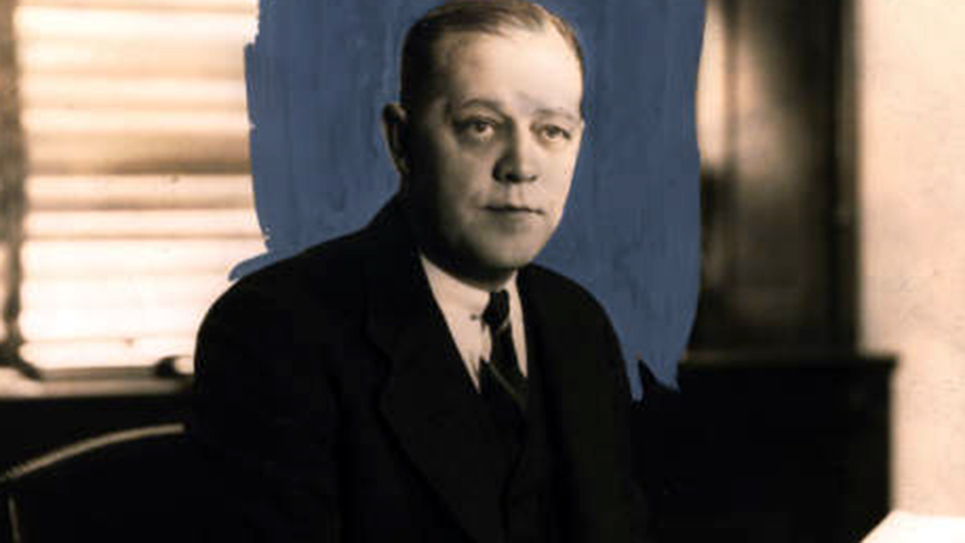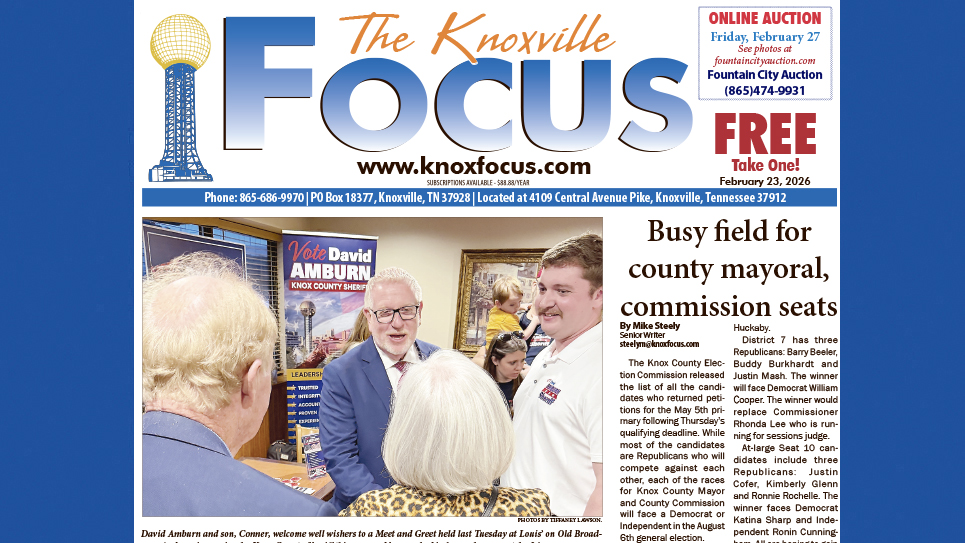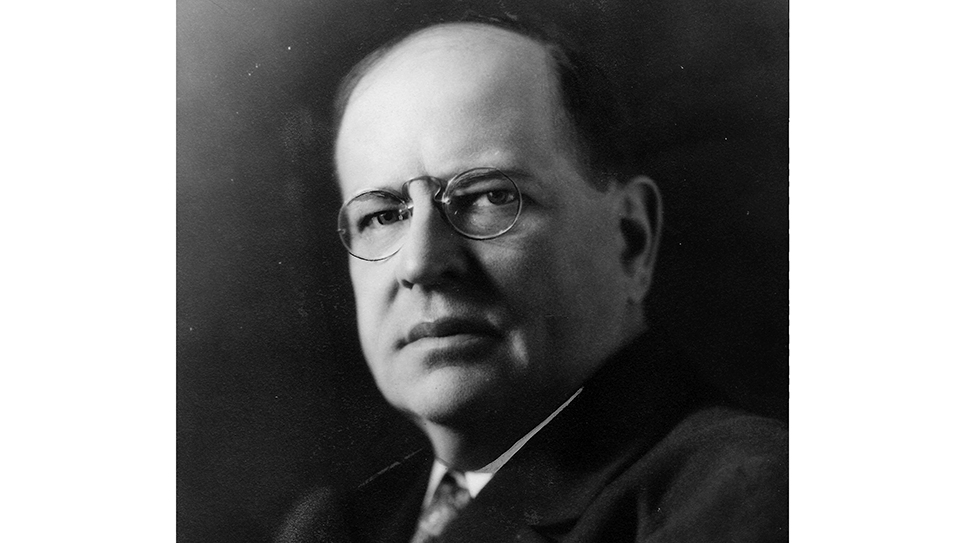Tennessee’s Herron Pearson
By Ray Hill
Tennessee’s Seventh Congressional District was a collection of rural counties in West Tennessee, the most populous of which was Madison County, where the county seat is the City of Jackson, named for Andrew Jackson. In 1933, the incumbent congressman for the Seventh District was Gordon Browning, a proud veteran of the First World War. Indeed, much of Browning’s support came from fellow veterans, and the congressman was a loud proponent of Tennessee’s ex-servicemen. Few politicians excelled Gordon Browning’s ability to press the flesh, and none seemed to enjoy the barbecues and dinners as much as the congressman, who usually finished off several plates of whatever was being served. Congressman Browning was a very ambitious fellow, and he was casting longing eyes toward a seat in the United States Senate. As Tennessee is unique inasmuch as it has three very different Grand Divisions, there was an unwritten rule in Volunteer State politics that no one Grand Division could occupy both of Tennessee’s seats in the U.S. Senate. That posed a big problem for Gordon Browning as the formidable Kenneth D. McKellar, Tennessee’s senior United States senator, was also from West Tennessee.
Browning toured the state, supposedly to listen to the people of Tennessee, before discovering there was no chance of beating Senator McKellar. Years later, in an oral history, Browning acknowledged he could not get a commitment from a single prominent person should he choose to challenge McKellar. Stubborn to a fault, Browning looked toward Nathan Bachman, a former justice of the Tennessee State Supreme Court who had been appointed by Governor Hill McAlister to the U.S. Senate when Cordell Hull resigned to become President Franklin Roosevelt’s secretary of state. Bachman would have to run for the remaining two years of Hull’s term in the 1934 election. Gordon Browning never allowed much in the way of conventional thinking to bar his ambitions. Browning announced his candidacy for the Senate seat held by Nathan L. Bachman. That opened up his congressional seat, and in quick order, a number of Democrats announced they were running for the House of Representatives.
One of the leading contestants to succeed Gordon Browning in Congress was Herron Carney Pearson, the former city attorney for Jackson. The son of a former county trustee, Pearson was relatively young, 43, when he first launched his candidacy for the House of Representatives. The candidate opened his congressional bid in Paris, Tennessee, an area where few people knew him. The country was two years into Franklin Roosevelt’s New Deal, and Pearson pledged all-out support for the president and his program. Pearson told his listeners the New Deal “must not be stopped until the emergency is passed.”
“We must of necessity give aid to the farmer, the merchant, small business, the forgotten man, industry and labor,” Pearson said. Herron Pearson, in particular, praised the Roosevelt Administration and the Reconstruction Finance Corporation for having stabilized the nation’s banks and the banking system. Pearson said if he were elected, he would support the reciprocal trade program so strongly advocated by Secretary of State Cordell Hull. Like most Democrats of his time, Herron Pearson was against most protective tariffs, as he believed they were injurious to the American economy because they stifled trade with other nations and closed trade outlets to American products.
Pearson hailed the Tennessee Valley Authority, saying the agency meant “the coal oil lamp can be dispensed with, the hauling of wood and fuel through rain and snow no longer necessary” in rural areas because of the power generated by TVA.
Unlike the glad-handing Browning, Herron Pearson was more reserved. George Morris, a columnist for the Memphis Commercial Appeal, wrote that Pearson was “a commanding figure” who possessed a “fine personality and ingratiating manner,” which helped him make many new friends throughout the Seventh Congressional District.
In a crowded primary of six candidates, the most serious opponent Pearson faced was Marshall Priest, a former state legislator who owned the Ford automobile dealership in Huntingdon. While in the state legislature, Priest had been identified as a supporter of Governor Henry Horton and Luke Lea. Horton had only barely escaped impeachment following the loss of much of the State of Tennessee’s money when Luke Lea’s business partner Rogers Caldwell’s financial empire collapsed. Marshall Priest had also sold cars to the State of Tennessee, and his congressional candidacy was hampered by that of schoolteacher Gordon Turner, who lambasted the former legislator throughout the congressional primary campaign.
Herron Pearson won the Democratic primary, carrying only two of the eleven counties comprising the Seventh Congressional District, but his majority in his home of Madison County gave him the Democratic nomination.
Pearson had no Republican opponent in the general election; in fact, during Pearson’s four campaigns for the House of Representatives, he never faced an opponent in the general election. The congressman-elect began organizing his office in preparation for leaving for Washington, D.C., following the fall campaign. At the time, the top staff person for a congressman or senator was called a “secretary,” which was the equivalent to a “chief of staff” today. Of course, while Herron Pearson was in the House, the average congressman had a staff of perhaps four people. Pearson chose D.C. “Scott” Daniel, the city attorney for Paris, Tennessee, as his top staffer. As his chief stenographer (personal secretary), Pearson asked his present secretary, Miss Bessie Buffaloe, to go with him to the Capitol, and she agreed.
It became quite clear that life for Congressman Pearson and his wife would be quite different than what they were used to back home in Jackson. The speaker of the house was Joseph W. Byrns of Nashville, and when Mrs. Byrns threw a party for the members of Congress in January 1935, Mrs. Herron Pearson was one of the ladies pouring tea for guests. Clad in a gown of black velvet with turquoise adornment, Mrs. Pearson poured tea in the beautiful Chinese Room of the elegant Mayflower Hotel, where Speaker and Mrs. Byrns had an apartment.
Herron Pearson was one of those few congressmen who arrived in Washington, D.C., without any previous legislative experience. In any legislative body, relationships matter, especially in getting things done for the folks back home. George Morris of the Commercial Appeal noted Pearson had made an excellent first impression upon his senior colleagues, who thought he had a bright future.
Congressman Herron Pearson immediately immersed himself in the daily routine of a productive legislator, working with Senator McKellar and Congressman Jere Cooper of Tennessee’s Eighth District to seek federal assistance for various projects in West Tennessee. Mrs. Pearson was deeply involved in the various social activities of Washington, D.C., frequently entertaining people from Tennessee, as well as other legislators. Pearson’s initial committee assignment was to the House Veterans’ Affairs Committee.
The congressman was a candidate for reelection in 1936, which was the peak of the New Deal in the United States. Pearson had managed to entrench himself in office during his first two years due to hard work and carefully cultivating his home folks. Congressman Herron Pearson had the luxury of having no opponent in either the primary or general elections.
The careful attention to the wants and needs of the people kept many congressmen in office, and Herron Pearson was highly attentive to the people of Tennessee’s Seventh Congressional District. The Civilian Conservation Corps was a boon to many young men in America during the Depression, as it provided much-needed work and a paycheck to able-bodied youngsters, most of whom sent the bulk of the money they earned back home to their families. The CCC included unmarried men ages 17 to 28 and was one of the most successful of the New Deal’s “work relief” programs. Just north of Jackson was a CCC camp on the Humboldt Highway, which had first been named Camp Pat Harrison. It was changed to Camp Herron Pearson in honor of the local congressman who was a special guest at the mess hall for dinner. Pearson expressed his profound appreciation for the honor, and Sergeant E. S. Taylor gave a reply. The dinner menu, all prepared in the camp’s kitchen, included “broiled steak, French fried potatoes, asparagus tips, celery, olives, pickles, lettuce and tomato salad, hot rolls, cherry pie à la mode and coffee,” as well as a fruit cup.
Social events back home in Tennessee may not have been as glamorous or as numerous as those in Washington, D.C., but they were far more important to those congressmen who liked their jobs. Congressman and Mrs. Pearson were at the West Tennessee District Fair horse show, one of the biggest social events in that part of the state. Mrs. Pearson’s nephew, James Gooch of Los Angeles, accompanied them to the horse show.
Congressman Pearson faced opposition inside the Democratic primary in 1938. Claude C. Toler was a three-term state senator from Henry County. Thirty-eight years old, Toler was a lawyer and president of a business college in Paris, Tennessee. On paper, Toler seemed to have the makings of a serious opponent. The second opponent, Claud Turner, was from Selmer and was running as a member of the Townsend movement, which was a scheme to provide a large monthly income for senior citizens, which had to be spent entirely the same month it was received.
In a radio speech, Toler told residents of the Seventh District, “Your choice of a United States Congressman will show whether or not you approve of the program of the Democratic party under the leadership of Franklin D. Roosevelt.” Toler cried he was “whole-souled” for the president and his programs. Toler asked voters to “promote me from the office of state Senate to Congress” because he would have a “better opportunity to help the cause of human liberty, human rights, and human welfare” in Washington, D.C.
Toler’s campaign for Congress was noisy, as he was accompanied throughout the district by the Chickasaw Ramblers, who furnished the musical interludes. The only criticism of Congressman Pearson that Toler could make was the incumbent’s supposed failure to aid the farmers and that he had drawn a good salary. Toler wondered if Pearson had been seen by many of the people of the Seventh District. Claude Toler answered his own question, saying Herron Pearson had been “too busy playing high society life and attending ‘pink teas’ and matinee parties.”
On Election Day, Democrats went to the polls and affirmed the record of Congressman Herron Pearson, handing Claude Toler a stinging and humiliating defeat. Pearson won 21,624 votes to a paltry 4,984 for Toler. Even more embarrassing for Toler was the fact that his home county of Henry supported the incumbent by a wide margin. Pearson carried every county in the Seventh District.
Having run an active campaign and defeated a serious contender easily, no Democrat was tempted to take a chance in running against the congressman in 1940. Once again, Herron Pearson had no opposition in either the primary or general elections. It would be his last term in Congress.
While Pearson had been working in Washington, the Murray family was busy building a formidable political machine in Madison County. Tom Murray was determined to run for the House in 1942, and his brother David would serve as district attorney for more than four decades. Pearson decided he didn’t care to wage yet another expensive campaign for reelection and announced his retirement. Moreover, Herron Pearson had been earning a handsome living practicing law before he went to Congress and wanted to be able to provide for his family. Columnist George Morris lamented Pearson’s decision, writing the congressman was an “able, honest, fearless and representative of the highest type of House member.”
Herron Pearson returned home to Jackson, where he happily practiced law for another decade. At 2:00 p.m. on the afternoon of April 24, 1953, the former congressman suffered a massive heart attack in his law office. Pearson died en route to a local hospital in the ambulance. A man who loved the law, served the people of his community and came home to live amongst the people who honored him so often, Herron Pearson deserves to be remembered.
© 2025 Ray Hill







